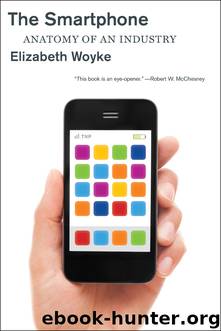The Smartphone by Woyke Elizabeth

Author:Woyke, Elizabeth [Woyke, Elizabeth]
Language: eng
Format: epub
ISBN: 9781595589682
Publisher: New Press, The
Worker dismantling toner cartridges, covered with toner, in Guiyu, China (Basel Action Network/Flickr)
When Zhao first visited Guiyu in 2006, he saw another set of workers immersing those circuit boards in buckets of burning acid to extract valuable metals, such as gold, silver, and copper. The buckets emitted thick, toxic smoke. Zhao’s film shows one of these workers warning onlookers, “Go away, you can’t handle this; it’s too choking. The sky is burning black.”35 Zhao recalls: “I tried to take a quick look at what was going on inside one of the vats, but the smoke burned my eyes immediately. . . . Those guys wear a pair of gloves [to protect their hands from the acid] and that’s it. I don’t know how they can deal with it for so long.”
Zhao says these acid vat plants paid more than Guiyu’s other entry-level e-waste jobs and thus were able to find willing workers. “These people are mostly concerned with economics,” explains Zhao. “They’re not thinking how bad their health will be ten years from now.”
Naturally there are health consequences to both living and working in Guiyu. The town has been processing e-waste since the early 1990s, and years of burning, melting, and acid-stripping e-waste have left the air, water, and soil polluted with lead and other toxic metals. “You smell Guiyu before you get there,” says Zhao. “It smells of burning wires and circuitry.” A 2010 study conducted by the nearby Shantou University Medical College found as many as eight out of ten Guiyu children had lead poisoning, which can affect mental and physical development.
The Chinese government banned the import of toxic e-waste back in 2000, but Guiyu continues to receive and process e-waste due to corruption. The local government reaps a “significant portion . . . of its annual revenues” from the practice and does not enforce regulation, according to a 2013 StEP Initiative report.36 “Beijing wants to get rid of [the illegal e-waste business], but the local government isn’t ready yet, because of economic considerations,” says Zhao. “If [local government officials] follow the rules, it’s basically death to the local economy, and they haven’t found another business to replace it.”
There has been progress. In 2013, China launched a ten-month campaign, Operation Green Fence, to firm up enforcement of its e-waste laws. The initiative stationed customs officials at Chinese ports to check the quality of foreign scrap. Shipments that exceeded the Chinese legal limit of 1.5 percent of contaminants were returned to their originating countries, causing a significant drop in e-waste imports. On Zhao’s most recent Guiyu trip, in 2013, he saw fewer dilapidated workshops and no acid vat plants. He says, “There are still piles of junk [on the ground], but they are much smaller and less obvious than a few years ago.”
Another change in recent years is that much of the e-waste in Guiyu now comes from within China. China’s burgeoning middle class is buying more gadgets, and the country is now home to at least 1.2 billion cellphones, many of which will be discarded in coming years.
Download
This site does not store any files on its server. We only index and link to content provided by other sites. Please contact the content providers to delete copyright contents if any and email us, we'll remove relevant links or contents immediately.
| AI & Machine Learning | Bioinformatics |
| Computer Simulation | Cybernetics |
| Human-Computer Interaction | Information Theory |
| Robotics | Systems Analysis & Design |
Algorithms of the Intelligent Web by Haralambos Marmanis;Dmitry Babenko(18334)
Jquery UI in Action : Master the concepts Of Jquery UI: A Step By Step Approach by ANMOL GOYAL(10487)
Test-Driven Development with Java by Alan Mellor(7768)
Data Augmentation with Python by Duc Haba(7637)
Principles of Data Fabric by Sonia Mezzetta(7408)
Learn Blender Simulations the Right Way by Stephen Pearson(7323)
Microservices with Spring Boot 3 and Spring Cloud by Magnus Larsson(7162)
Hadoop in Practice by Alex Holmes(6753)
RPA Solution Architect's Handbook by Sachin Sahgal(6540)
The Infinite Retina by Robert Scoble Irena Cronin(6249)
Big Data Analysis with Python by Ivan Marin(5971)
Life 3.0: Being Human in the Age of Artificial Intelligence by Tegmark Max(5558)
Pretrain Vision and Large Language Models in Python by Emily Webber(4927)
Infrastructure as Code for Beginners by Russ McKendrick(4681)
Functional Programming in JavaScript by Mantyla Dan(4561)
WordPress Plugin Development Cookbook by Yannick Lefebvre(4424)
The Age of Surveillance Capitalism by Shoshana Zuboff(4293)
Embracing Microservices Design by Ovais Mehboob Ahmed Khan Nabil Siddiqui and Timothy Oleson(4179)
Applied Machine Learning for Healthcare and Life Sciences Using AWS by Ujjwal Ratan(4162)
